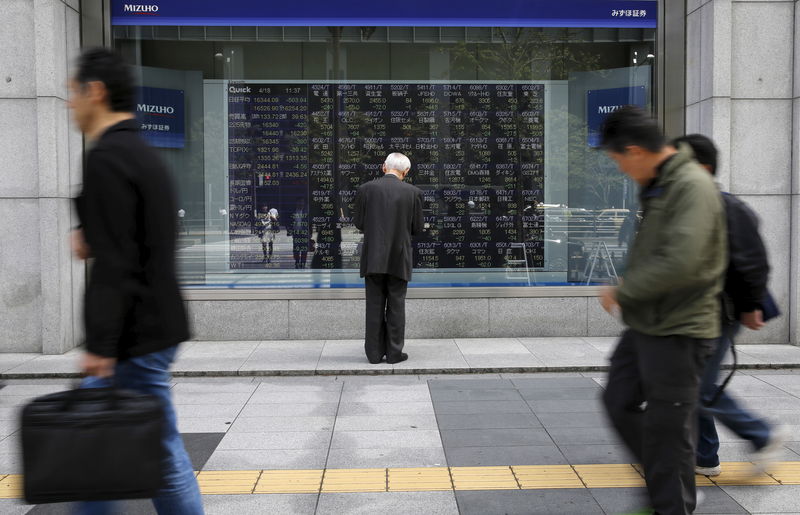By Swati Pandey and Daniel Leussink
SYDNEY/TOKYO (Reuters) - The chances of recession have faded enough for emerging market investors to plow billions of dollars into Asian stock markets, but not enough to buy shares in the region's banks.
After a year-long sell-off, stocks in Asian banks are languishing at multi-year, crisis era lows, even though their lending business should benefit from the Federal Reserve and other central banks easing up on monetary tightening as they switch to a pro-growth stance.
Rising hopes that the United States and China will soon de-escalate their trade war has encouraged buying in other cyclical sectors, but few banks are making it onto investors' shopping lists.
Besides the reduced, but still abiding risk of a sharp economic slowdown, investors are deterred by onerous regulatory changes introduced for lenders since the last crisis.
"Valuations are cheap but they are cheap for a reason," said Olivia Mayell, London-based investment specialist of multi-asset solutions at JPMorgan (NYSE:JPM) Asset Management.
"We're not currently confident enough to want to own banks, we'd look for more stable value, for recession-proof assets. Not to say recession is coming soon, but these things get priced into asset values well in advance of when they happen."
Asian banks are cheap. Going by the broadest measure, MSCI's index for Asia ex-Japan banks trades at a price-to-book (P/B) ratio of 0.9, lower than it has been during financial crises in 1997, 2001 and in 2008.
The price-to-book (P/B) ratio, a popular metric for measuring valuation, compares stock price with underlying assets. A ratio below 1 could indicate either an undervalued stock or that investors have concerns about how well the stock is backed up by assets. The low banks' P/B is a red flag for investors.
(Graphic: Asian banks' price-book ratio lags other sectors - https://tmsnrt.rs/2CaEC5c)
Some analysts, who think banks are a good buy, argue that banks' book values, which reflect net assets, may have been undermined by the past three years of rising interest rates and a broad reduction in corporate borrowing. But as policy interest rates are cut, book values will recover, they say.
Yet, there are more reasons to regard them as risky investments.
Banks would be prime losers if the United States slips into recession, dragging down global growth and demand. Even if Asian growth holds up, investors have for long struggled to evaluate the quality of banks' assets and quantum of bad loans.
New regulations are also being rolled out that potentially hamper bank profitability ranging from India's new bankruptcy code and requirements for capital to South Korea's plans for internet banks and capital-raising by traditional big banks.
"A lot of people still remember what happened during the financial crisis. That made banks really out of favor and that is reflected in the really trough valuations," said Jian Shi Cortesi, an Asian equities portfolio manager at GAM Investment Management in Zurich.
HOSTAGE TO POLICY
The idea that banks' fortunes are hostage to sometimes fickle government policy also scares investors.
"In many cases, one share in a bank equals one share in a country. Banks in emerging markets are a regulated business. They are often driven by what's happening in government policy," said Sean Taylor, chief investment officer for the Asia Pacific at Deutsche Bank's asset manager DWS in Hong Kong.
Taylor cites China as an example where, despite easing policy, some banks have been squeezed in a scramble for funds.
South Korean banks are also trading at lows last seen before the 2008/09 financial crisis, he said, because domestic regulations are limiting their ability to make money.
The other big risk is that, despite all efforts, the U.S. economy slips into recession, dragging global demand down.
Some analysts see more value in owning sectors like technology or healthcare, which are just as sensitive to growth and demand as banks, but are more resilient.
The extreme cheapness of banks could mean there is room for a rally in the next 6 months to a year, said GAM's Cortesi.
Still, she said: "If you are investing in Asia growth, you probably don't want to be in banks."
Consumer stocks, technology and real estate have all posted double digit growth in the past two months. Banks gained 5 percent, underperforming the broad Asian shares' 10 percent jump.
Even among banks, plenty of investors see value in India's better-capitalized private sector banks and Thai banks. Outliers include Indonesia's Bank Mandiri, which has risen 33 percent since 2015, outperforming the broader Jakarta index's near 25 percent gain. Singapore's DBS is up by a quarter in four years having defied a fall in Singapore markets.
In a sign of investor enthusiasm for Asian assets, global emerging market funds have registered net inflows of about $21 billion since the week of Nov. 7, with gains in 14 of the past 16 weeks, Nomura said in a report released on Feb. 26.
Yet, only six banks feature in Nomura's list of 52 'buy' rated stocks in Asia - India's SBI, ICICI and Axis, Indonesia's Bank Mandiri and Metropolitan Bank and BPI in the Philippines.

Asian tech giants Alibaba (NYSE:BABA) Group and Tencent Holdings, insurance group Ping An, Hong Kong property firm China Overseas Land and Hong Kong's MTR are among Nomura's top 5 picks.